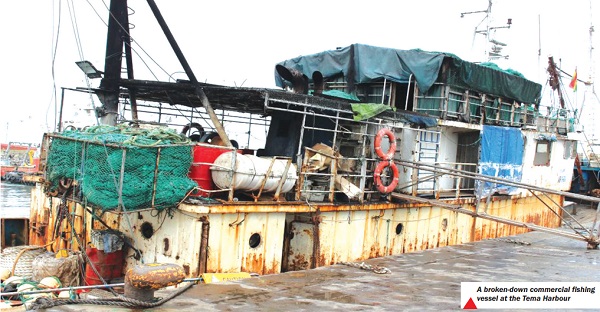The Executive Chairman of the Gulf of Guinea Maritime Institute (GoGMI), a non-profit maritime think-tank, Vice-Admiral Issah Yakubu (retd), has advocated the establishment of a dedicated Ministry of Blue Economy.
He said such a ministry would not only prioritise activities in the sector, but also improve coordination among stakeholders.
Currently, the Blue Economy Commission is situated within the Ministry of Fisheries, but the former Chief of Naval Staff believes that is a misnomer.
"The blue economy is bigger than fisheries. We should have a Ministry of Blue Economy, with the Fisheries Commission under it," he emphasised.
Vice-Admiral Yakubu further explained that the current setup leads to overlapping of rules and regulations, thus hindering effective management of the sector.
His call comes as countries around the world were increasingly recognising the importance of the blue economy, with many establishing dedicated ministries or agencies to oversee the sector.
Ghana's Blue Economy Commission was established to promote the sustainable development of the country's marine resources.
Piracy
Touching on piracy, Vice-Admiral Yakubu said that although the Gulf of Guinea had long been plagued by piracy and maritime insecurity, recent efforts by West African nations and international partners had brought new hope to the region.
He mentioned the Yaoundé Code of Conduct and Architecture, signed by some West and Central African countries, which he said had improved coordination and enforcement among regional navies.
The retired Chief of Naval Staff described Nigeria's deep blue project, a $195 million initiative to enhance maritime security in that country, as significant.
This project included the acquisition of ships, aircraft and drones, as well as the installation of state-of-the-art surveillance systems.
Vice-Admiral Yakubu added that other countries in the region, including Ghana, Senegal and Côte d'Ivoire, had also invested in maritime security.
"Ghana, for example, has implemented innovative measures such as armed guards on fishing vessels, which have proved effective in deterring pirate attacks," he said
The former Chief of Naval Staff said that the progress made in maritime security has had a positive impact on the region's economy.
Maritime security
Vice-Admiral Yakubu also said that the Ghana Ports and Harbours Authority (GPHA) in 2024 recorded a container traffic of 1.7 million 20-foot equivalent units (TEUs), a testament to the country's improved maritime security, compared to 1,226,635 TEUs recorded in 2024 and 1,244,245 TEUs in 2022.
He, therefore, said that sustained investment in maritime security was crucial to maintaining long-term stability in the region, adding, "We cannot rely on our partners all the time. We have to be self-sustaining".
Vice Admiral Yakubu said that as long as West African nations continued to work together to address maritime security challenges, the region was poised to become a beacon of stability and prosperity.
Writer's email: benjamin.glover@graphic.com.gh

